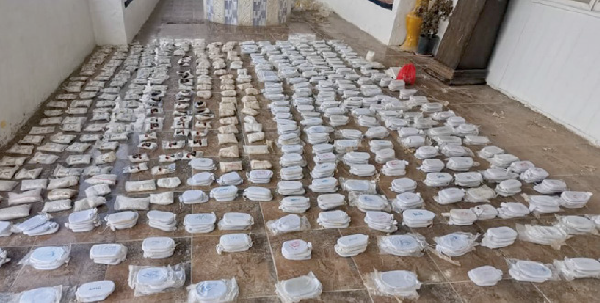You are here
Despite recent drug crime decrease, JSF study recommends further research
By Mays Ibrahim Mustafa - Jun 27,2023 - Last updated at Jun 27,2023

Drugs seized by troops in the Eastern Military Zone at Syrian border are seen in this photo dated December 29, 2022 (Petra file photo)
AMMAN — There have been 18,334 drug-related crimes in 2022, marking a 4.1 per cent decrease compared to the previous year, according to a recent study by the Jordan Strategy Forum (JSF).
The study, titled “International Day Against Drug Abuse: The Reality in Jordan”, noted that statistics from the Public Security Directorate indicate a “significant” increase in drug-related crimes in the last decade.
Though drug crime spiked significantly approximately one decade ago, increasing by 73.3 per cent from 2013 to 2014, the last two years have witnessed a decline, at a rate of 4.7 per cent in 2021 and 4.1 per cent in 2022.
“This decline is a positive reflection of the efforts of various concerned authorities — especially the Anti-Narcotics Department of the Public Security Directorate,” the report stated.
The year 2020 saw the highest number of recorded drug crimes, reaching 20,055 incidents or 19 crimes per 10,000 inhabitants, according to the study.
Statistics within the report indicate disparities in the rate of drug-related crimes per 10,000 inhabitants in 2022, that vary based on geographic location.
Aqaba registered the highest rate of drug-related crime in the Kingdom, equal to 43 drug crimes per 10,000 inhabitants. The lowest rate, at 2 drug crimes per 10,000 inhabitants, was recorded in the Southern Badia area, it said.
The study also cited a statement from Jordan’s Deputy Prime Minister and Minister of Foreign Affairs and Expatriates Ayman Safadi, during a panel discussion on fighting cross-border drug smuggling threats at the Brookings Institution in January 2022.
Safadi said: “Our border with Syria is 367 kilometres. In the past few years, the biggest threat from the situation there has been terrorist organisations. Now, hardly a week goes by without our army thwarting one or two attempts to bring drugs into the country. In the past, we were seen as a transit market ... But now, with the emergence of [cheaper] chemical drugs, such as Captagon, we became a target”.
The study recommended that the Anti-Narcotics Department cooperate with the Ministry of Health in conducting detailed scientific research on drug use and its consequences in Jordan.
“It is also necessary to allocate special treatment centres for juvenile drug users, and create follow-up health and behavioural care programmes for addicts after their discharge,” the report recommended, highlighting the importance of continuous follow-up with newly recovered addicts in order to prevent relapses.
Related Articles
AMMAN — Drug-related cases decreased by 9 per cent from the beginning of the year until June 26, 2022, compared with the same period of 2021
AMMAN — The Kingdom, over the past decade, has witnessed approximately 151,000 drug-related crimes, averaging one crime every 28 minutes, ac
AMMAN — A local study released on Wednesday on the magnitude of illicit narcotics in the Kingdom indicated that the large number of refugees

















